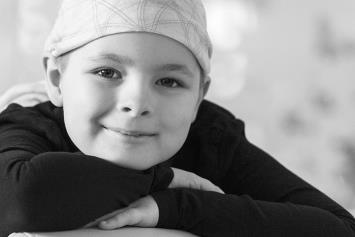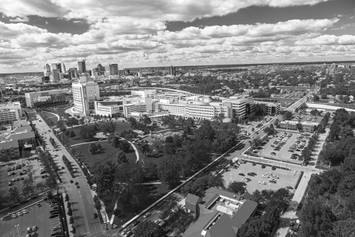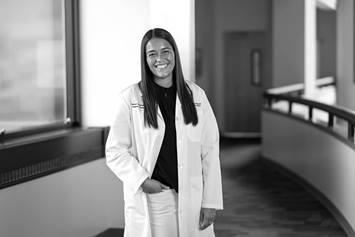Pediatric Blood Marrow Transplant and Cell Therapy Fellowship
Pediatric Blood Marrow Transplant and Cell Therapy Fellowship
The Pediatric Blood Marrow Transplant and Cell Therapy Program at Nationwide Children's Hospital offers a one-year fellowship for qualified physicians who've completed a basic three-year program in pediatric hematology/oncology, and who wish to pursue further training in pediatric blood and marrow transplantation.
The Bone Marrow Transplant Fellowship at Nationwide Children’s Hospital was established in 2015. In 2021, five fellows have successfully graduated from the program.
In 2019, the American Society for Blood and Marrow Transplantation (ASBMT) was formally renamed the American Society for Transplantation and Cellular Therapy (ASTCT), and the Pediatric Bone Marrow Transplantation Consortium (PBMTC) similarly changed its name to the Pediatric Transplantation and Cellular Therapy Consortium (PTCTC). This change reflected the rapidly expanding role of both cellular therapies as well as the hematology/oncology trained physicians caring for patients receiving these novel treatments.
In the past ten years, the evolution of cell therapy has moved from an experimental modality to a widely utilized and mainstream therapy. In recognition of the expanding knowledge base and increasing skill set essential to the delivery of these treatment modalities, the Bone Marrow Transplant Fellowship is now formally named the Blood Marrow Transplant and Cell Therapy Fellowship (BMT/CT Fellowship).
The fellowship position is available beginning July 1, but other accommodations may be possible for qualified individuals.
The position meets all criteria for clinical training in BMT/CT as identified by the American Society for Transplantation and Cellular Therapy (ASTCT) and the Federation for Accreditation of Cell Therapy (FACT). If candidates are interested in laboratory research, there is the possibility of spending additional time working in one of the center’s basic or translational research programs.
What You Need to Know
Training and Experience
The goal is to train physicians to be competent in the use of hematopoietic cell transplantation and cellular therapy for the treatment of malignant and non-malignant diseases. Specifically, our program trains physicians in indications for transplant; pre-transplant patient evaluation; identification and selection of stem cell sources; use of donor registries; methodologies of HLA typing; marrow cryopreservation; management of ABO incompatible cell products; administration of high-dose chemotherapy; management of neutropenic fever; management of bacterial/viral/fungal diseases in immunocompromised patients, management of bleeding diathesis, diagnosis and management of regimen related toxicities, diagnosis and management of acute and chronic graft-versus-host disease, late complications of marrow transplantation; terminal care; as well as training in documentation and reporting for patients being treated on investigational trials.
Trainees gain experience in bone marrow harvest, stem cell apheresis, stem cell product infusions, and advanced cell processing techniques.
Trainees are encouraged to participate in protocol design and development and complete a clinical research project related to transplantation during the course of their training.
Curriculum
The curriculum is based on fundamental core requirements but also has flexibility to accommodate the unique learning needs of the matriculated fellowship applicant, which may be dependent on their ultimate career goals and/or designed to build upon their past experiences. For instance, matriculating fellows may wish to continue building upon their hematology/oncology fellowship research during their BMT/CT year – facilitating their likelihood of successfully obtaining extramural funding with a mentored research career development award at the end of the fellowship/beginning as junior faculty. Alternatively, matriculating fellows with a strong interest in clinical acute GvHD management or long-term complications may spend additional time focusing on these interests.
- Clinical time in inpatient and outpatient settings. Fellows should achieve gradual independence as they demonstrate clinical competence in the BMT/CT curriculum. At the start of training, fellows are expected to be directly supervised with an aim to achieve indirect supervision as competence is gained. The goal is training and experience in initial consultation, donor/recipient work-up, graft/conditioning selection, and pre-, peri-, and post- BMT/CT management of care and associated complications.
- Laboratory-related experience, including stem cell processing lab, human leukocyte antigen (HLA) lab, apheresis collection facility/stem cell procurement facility and stem cell/cellular therapy processing laboratory.
- Research experience with a selected mentorship committee. This may include a wide variety of focus spanning basic science, clinical and/or translational research, guided by trainee interest and mentor expertise.
- Regular didactic multidisciplinary conferences for formal teaching and educational sessions.
- Active participation in department meetings, journal clubs, case review sessions and multidisciplinary conferences including nursing, administrators, coordinators, advanced practice providers, pharmacists, physical therapists, nutritionists, etc. Participation can involve presentations of cases, donor selection, discussion of pertinent data and participation in shared decision-making.
- Pediatric BMT/CT trainees may benefit from exposure to adult centers and practices; similarly, adult BMT/CT trainees may benefit from exposure to pediatric centers and practices.
Fellowship Schedule
- 12 weeks of clinical BMT/CT inpatient service to attain adequate competencies in common inpatient BMT clinical scenarios (may be divided into blocks of no less than two weeks’ duration).
- 12 weeks of BMT/CT clinic rotation to gain adequate competencies in specialized pre and post BMT/CT consultation and follow-up. During this rotation the fellow will attend each clinic that occurs (may be divided into blocks of no less than four weeks’ duration).
- Four weeks at The Ohio State University/The James Cancer Hospital's Adult BMT/CT Program. Pediatric BMT/CT trainees may benefit from exposure to adult centers and practices. Similarly, adult BMT/CT trainees may benefit from exposure to pediatric centers and practices.
- Two weeks to include time at the HLA Laboratory, Cell Therapy Laboratory, GMP Facility and blood bank. These may be arranged through existing programs at Nationwide Children's or OSU Wexner Medical Center.
- Two to four weeks on the apheresis service performing stem cell collection and photopheresis procedures.
- 18 to 20 weeks of protected research time to conduct a research project. As described above, within the limitations of a one-year fellowship, fellows will be expected to conduct a secondary database, retrospective or limited translational science research project and prepare it for presentation at a national meeting during their fellowship year. Additional electives choices would be subtracted from this research time; thus, evidence of adequate research progress must be demonstrated to gain fellowship director approval for any additional electives. Vacation (PTO) time will be approved only during research blocks.
- Actively participate in BMT meetings. The group meets weekly to discuss the inpatient, outpatient census and any new consultations or internal referral to transplantation. The group is made up of faculty and supportive services (nursing, APNs, psychosocial services, etc.) who all share a common interest in BMT/CT.
- A collection of key ‘benchmark’ manuscripts and updated clinical practice guidelines and standard operating procedures in the field of BMT/CT will be maintained by the faculty. Fellows will be expected to review these during the one-year fellowship.
- Fellows will develop and deliver a comprehensive review on a topic of their choice to the faculty and any rotating trainees twice during the year.
Fellowship Year At a Glance
| Duration | Description |
| 12 weeks | BMT service (inpatient/consultations) |
| 12 weeks | Clinic rotation |
| 4 weeks | Adult BMT rotation at The Ohio State University |
| 2-4 weeks | HLA Laboratory, Cell Therapy Laboratory, GMP Facility, blood bank |
| 2-4 weeks | Apheresis |
| 12-18 weeks | Research project plus BMT weekend call |
| 3 weeks (15 days) | Vacation (PTO) |
| 1 week (5 days) | Professional time (travel to professional meetings) |
| 3 weeks (15 days) | Sick leave (PTO), as needed, per Nationwide Children's employment policies |
Meet Our Faculty and Fellows
Click here to view our faculty.
Faculty clinical and research interests include cellular therapy, infection in immunocompromised patients, non-malignant diseases (hemoglobinopathy and primary immunodeficiency), organ toxicity (graft-versus-host disease, veno-occlusive disease) and survivorship.
Our faculty members have leadership roles and actively participate in the American Society for Transplantation and Cellular Therapy (ASTCT), Center for International Blood and Marrow Transplant Research (CIBMTR), Children’s Oncology Group (COG), International Society of Cellular Therapy (ISCT), Pediatric Acute Lung Injury and Sepsis Initiative (PALISI) and Pediatric Blood and Marrow Transplant Consortium (PBMTC).
Research
Research education and training are vital to the mission of Nationwide Children's Hospital and The Abigail Wexner Research Institute at Nationwide Children's Hospital. As a top-ten free-standing pediatric research center and an academic affiliate of The Ohio State University, The Research Institute has an outstanding faculty, dedicated to training and mentoring the next generation of scientists in pediatric research.
Research at Nationwide Children's Hospital
Advocacy
Advocacy training fosters and encourages interest in child advocacy by early involvement and exposure to its many aspects such as addressing social determinants of health, community collaboration, health finance, health policy and legislative advocacy.
Eligibility
The fellowship candidate:
- Should have completed pediatric residency and hematology/oncology/BMT or immunology fellowship training in the U.S. or Canada
- Must be eligible for an Ohio medical license
- Shall be board-certified or eligible in general pediatrics and board-certified or eligible in pediatric hematology/oncology/BMT or immunology
- Shall provide a formal application, a minimum of two references, and interview with the BMT/CT faculty, leukemia/lymphoma team and selected nursing support staff
Selection of fellows will be on a competitive basis. The applicants will be ranked based on evidence of clinical excellence, ability to work with others and potential to advance the field.
Apply Now
Applications will be accepted and reviewed throughout the year. Once applications are reviewed, invited candidates will be asked to interview.
Interested applicants should provide the following information to the program coordinator:
- Application
- Curriculum vitae
- Personal statement
- Two letters of recommendation
- USMLE or COMLEX scores
- Transcript
- Medical Student Performance Evaluation (MSPE)
- ECFMG status report (include copy of certificate) *if applicable
- Photo
Please send materials to:
Tami Davis
Program Coordinator
Nationwide Children's Hospital
700 Children's Drive
Columbus, Ohio 43205-2696
Phone: (614) 722-3553
Fax: (614) 722-3699
PedHemOncBMTFellowships@NationwideChildrens.org
Salary and Benefit
Our Fellows are hospital employees, and as such, they are eligible for the same benefits other full-time staff receive (with the exception of paid time off, which is outlined.)
Evaluation of Trainees
Trainees will be evaluated via utilization of Med Hub system:
- Once for each inpatient rotation
- Quarterly for clinic experiences
- Trainees will meet formally with the fellowship mentor and program/associate director every three months to evaluate progress
Evaluation of Program and Faculty
- Trainees will evaluate the program experiences and faculty biannually
- Semi-annually the program directors will review anonymous feedback data
Contact
For more fellowship information, please contact PedHemOncBMTFellowships@NationwideChildrens.org.
Phone: (614) 722-3553
Fax: (614) 722-3699
Additional Contact Information
Tami Davis
Program Coordinator
Tami.Davis@NationwideChildrens.org
Sign up for PediatricsOnline
Connect with us to learn about the latest research discoveries and clinical innovations in pediatric hematology, oncology and blood & marrow transplant.



